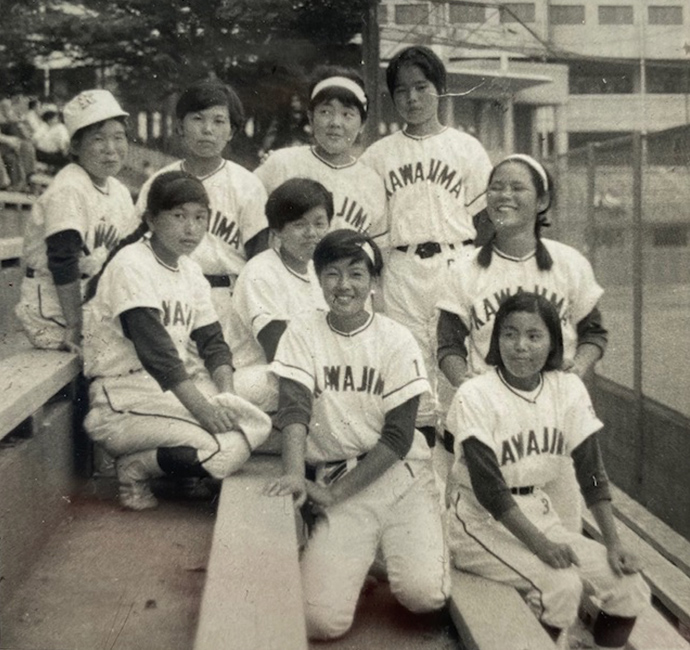
Expert Views

Taeko UtsugiFacing everyone earnestly and sincerely
First Published in Japanese in March 2024 [4 parts]
Part 1: Helping people grow starts with understanding them as individuals

── Could you start by telling us how you first got into softball?
I am the youngest of five children, so my mother was always comparing me to my older siblings. “Why are you so bad at your studies, when your brothers and sisters are doing so well?” It’s true that I was not a good student, but my mother’s words always got to me.
I decided the only way to impress my mother was through sport. Ever since I was little, I had been able to beat anyone at running races and was invited to join several different clubs when I started junior high school.
I tried out a few sports clubs before deciding on softball. It was all down to a certain teacher who said to me: “Everyone is unique. You should take up softball to hone what makes you special and aim for the top.” At a time when I was struggling with feelings of inferiority about my studies, those words filled me with courage. I decided to join the club there and then. That was the start of my softball career.

Kawashima Junior High School softball team (Utsugi pictured middle row, far right)
── Would you say that you wouldn’t be where you are today without that teacher?
The greatest thing about that teacher was they praised people’s strengths, rather than just pointing out their faults. I still remember that teacher once asked me: “What are your good points?” I thought for a while before answering: “I have lots of energy, I have a strong sense of responsibility, I can’t stand losing, and I am good at taking care of people.” At that moment I suddenly realized, “Yes, these are my good points.” That’s when I learned the importance of knowing yourself by putting your strengths into words.
I have always held onto that important idea. When I became a coach, I would ask players to list five good points about themselves and their teammates. Knowing your and your colleagues’ strengths will help each person grow, which helps to build a strong team.
── I believe you made cards to try and understand each individual player, listing their playing characteristics, personality, and even their family structure.
We are all human, so everyone has their own strengths and weaknesses. Some players have the ability to play well, but nerves prevent them from performing to their full potential, while others can perform without fear in any situation. By understanding these differences, you can ensure each player is put in situations where they will perform at their best: this player when you’re in a tight spot, that player when there’s a chance, and so on. Even if someone doesn’t make the team regularly as a player, if she can always look around and analyze the situation, she might have the potential to be a great manager.
By understanding people’s unique personalities and strengths, you can give them opportunities to shine. Making the most of my players makes the most of me as a coach. I have always kept this in mind to build a strong team.
── Is there anything else you have always kept in mind as a coach?

I have always reprimanded players when they deserve to be reprimanded. I will not tolerate players who behave selfishly or act like they are special. That’s why I make a point of keeping a close eye on players both on and off the pitch.
When we were at training camps, if I found a pair of slippers that a player had carelessly thrown off in the dining hall, I would reprimand her and throw the slippers as far as I could! When staying at a hotel, I always asked the manager to check that the players had put away their bedding neatly and tidied up their trash before leaving the room. Lack of personal discipline in everyday life comes out on the softball pitch, so I made sure to be thorough about things like that.
── In business, managers often seem to find it difficult to reprimand junior colleagues these days. Can you give any advice?
If you need to reprimand someone, do it there and then. During the opening ceremony of the 2008 Beijing Olympics, there was an incident where a member of our team climbed up a pole for fun and was given a warning by the organizers. When I spoke to those involved, they said the players had not been disciplined. I thought this was a mistake as their conduct had been out of line.
The players must have known that I knew about this incident before I spoke to them. They must have been worrying: “Oh no! What’s Ms. Utsugi going to say?” A player can’t concentrate on practice or a game in that mental state.
It’s the same in the workplace. When you need to correct someone or speak to them about their behavior, if you say, “I’m busy now so I’ll do it later” or “I’ll leave it for now because there’s an important presentation coming up tomorrow,” it will become more and more difficult to do. For that person’s sake as well as your own, it’s important to always try to deal with issues on the spot.